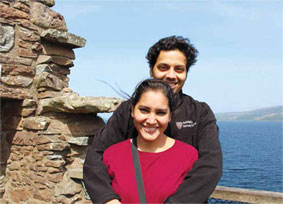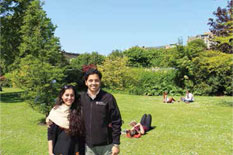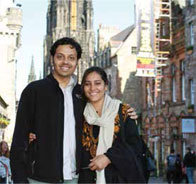It is not often these days that a college romance fructifies into a wedlock. Corporate Citizen unlocks the story of love that has culminated into marriage, for we believe in the stability of a relationship and family unit. We bring to you real-life romances that got sealed in marriage
If you don’t know about Rajat Sethi and Shubhrastha already, allow us to introduce you to them. The young duo rose to fame when it worked tirelessly to carve out a win for a political party in Assam in 2016. The couple that got married in December last year, is riding on the crest of a wave. While Rajat is the Advisor to Manipur CM, Shubhrastha is a common face as a panelist on news channels, fiercely debating and discussing contemporary issues. The power couple that has to stay apart often in order to meet professional commitments, manages to keep the flame of love burning. The team of two gets candid with about all things marriage and career...

Currently working as the Assistant Editor at India Foundation Journal , Shubhrastha lives by herself at a rented property in East Delhi, while Rajat, being the right-hand man of the CM of Manipur, is preoccupied with issues confronting the north east. Being the thorough professionals that they are, Shubhrastha and Rajat chose to forego a romantic honeymoon, so they could keep pace with professional goals and deadlines. Shubhrastha herself took just two days off from work for her own wedding. So, does work take precedence over love for this power couple? Pat comes the reply from Shubhrastha, “Though our professional lives are of utmost importance to us, our personal and family space with each other is the topmost priority, and hence, the choice of same profession helps.”
 Soaking in the sun at Edinburgh,Scotland
Soaking in the sun at Edinburgh,ScotlandShubhrastha metaphorses from a firebrand into a shy schoolgirl as she talks about how they fell in love with each other when they first met in year 2012, “We met through a common friend then and right from day one, took our relationship rather seriously. We had decided to marry each other instantly way back in 2012, when none of us were even sure of getting into politics.” Soon afterward, Rajat set out for the USA, where he pursued a Master’s degree in Public Policy at the prestigious Harvard Kennedy School and a three year dual degree between 2012 to 2015 at Boston University. Meanwhile, Shubhrastha , expended her energy and potential on momentous assignments, “I started working on elections in 2013 on Narendra Modi’s campaign and in 2015, on Nitish Kumar’s campaigns. In the meantime, Rajat began working in Assam in 2015. I joined him within a month of him starting out. It was a logical decision since we had been staying apart for three years. Not contrary to expectations, their bind grew stronger when they worked in unison in Assam to achieve the same goals, “I couldn’t help but fall in love with how committed he was to his work. I saw a reflection of myself in him when I learnt that he wanted to pursue good work. Sparks flew! We immediately struck a chord because of our burning desire to experiment with our careers and life,” shares Shubhrastha.
Shubhrastha, continues to be the perfect storyteller that she is, “One day, he confided in me about his desire to settle down emotionally and I was bowled over! I could sense the sincerity in his voice as he spoke dreamily about relationships.” Just like any other woman from a modest family background would, Shubhrastha had her reservations about a relationship with a US-returned man, armed with a degree from the coveted Harvard University. But like they say, matches are made in heaven and this one was no exception to this rule, “After we tasted success in Assam, we got married.”
 Rajat and Shubhrastha enjoy their time in Scotland
Rajat and Shubhrastha enjoy their time in Scotland“I for one, don’t know how success is measured. But if you must call us that (successful), attribute it partly to our choice of an unconventional career path,” Shubhrastha answers when asked about their success. Though she speaks humbly about her accomplishments, she doesn’t deny that being wedded to a professional colleagues doesn’t hurt, “There are times when I don’t want to meet prospective MLAs at 3AM. That is when Rajat fills in my shoes when the need arises. On the other hand, I can handle women oriented activities with ease.” Rajat pitches in, “The challenges of working in the same industry/ office are well documented, but it gets a little more interesting when it comes to politics. We share a common ideology and a political vision. In my opinion it is quite difficult for a couple with politics as a vocation to have divergent ideologies. Thankfully, having the same ideological stance has helped our relationship.”
But sometimes being both a married couple and colleagues can backfire, “Our discussions mostly revolve around work and we do not get much personal time either. If we happen to get some time off of our professional commitments, work pretty much takes up our personal space!” says Shubhrastha, while Rajat makes a point, “While working towards the same goal, individual approaches are likely to differ and cause friction. As is with most other cases, mutual respect is really important to sail through ego battles.”
“One day, he confided in me about his desire to settle down emotionally and I was bowled over! I could sense the sincerity in his voice as he spoke dreamily about relationships”
— Shubhrastha
The power couple is single-mindedly pursuing the same goal at the moment, “Sharing common goals for the north eastern region of India keeps us connected even though we are geographically divided. Together, we aspire to integrate the north east with the rest of India and bring the governance issues of its communities to the table.” The distance, however, is getting to Rajat, who is determined to work out a solution, “With time passing by, distance is taking a toll on us. We can’t afford to spend most of our youthful years staying away from each other. It is one challenge that we are working towards. Surprisingly, senior political leaders, inspite of being bachelors all their life, understand the constraints of a married couple working as political karyakartas. They try to do their best to accommodate our assignments in way so that we are in geographical proximity.”
By Namrata Gulati Sapra